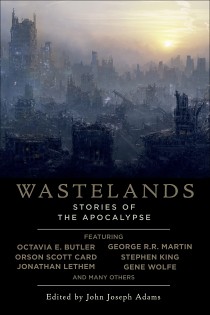Jeremy Lassen of Night Shade Books just posted the cover and cover copy for my forthcoming anthology, Wastelands:
Famine, Death, War, and Pestilence: The Four Horsemen of the Apocalypse, the harbingers of Armageddon–these are our guides through the Wastelands…
From the Book of Revelations to The Road Warrior; from A Canticle for Leibowitz to The Road, storytellers have long imagined the end of the world, weaving eschatological tales of catastrophe, chaos, and calamity. In doing so, these visionary authors have addressed one of the most challenging and enduring themes of imaginative fiction: the nature of life in the aftermath of total societal collapse.
Gathering together the best post-apocalyptic literature of the last two decades from many of today’s most renowned authors of speculative fiction, including George R.R. Martin, Gene Wolfe, Orson Scott Card, Carol Emshwiller, Jonathan Lethem, Octavia E. Butler, and Stephen King, Wastelands explores the scientific, psychological, and philosophical questions of what it means to remain human in the wake of Armageddon. Whether the end of the world comes through nuclear war, ecological disaster, or cosmological cataclysm, these are tales of survivors, in some cases struggling to rebuild the society that was, in others, merely surviving, scrounging for food in depopulated ruins and defending themselves against monsters, mutants, and marauders.
Complete with introductions and an indispensable appendix of recommendations for further reading, Wastelands delves into this bleak landscape, uncovering the raw human emotion and heart-pounding thrills at the genre’s core.
John Joseph Adams is the assistant editor of The Magazine of Fantasy & Science Fiction. In addition to his work at F&SF, Adams is a reporter for SCI FI Wire and a book reviewer for Publishers Weekly and Intergalactic Medicine Show. His essays, interviews, and reviews have also appeared in Amazing Stories, Kirkus, The Internet Review of Science Fiction, Locus Magazine, Strange Horizons, and Subterranean Magazine.

Table of Contents
- The End of the Whole Mess — Stephen King
- Salvage — Orson Scott Card
- The People of Sand and Slag — Paolo Bacigalupi
- Bread and Bombs — M. Rickert
- How We Got Into Town and Out Again — Jonathan Lethem
- Dark, Dark Were the Tunnels — George R. R. Martin
- Waiting for the Zephyr — Tobias S. Buckell
- Never Despair — Jack McDevitt
- When Sysadmins Ruled the Earth — Cory Doctorow
- The Last of the O-Forms — James Van Pelt
- Still Life with Apocalypse — Richard Kadrey
- Artie’s Angels — Catherine Wells
- Judgement Passed — Jerry Oltion
- Mute — Gene Wolfe
- Intertia — Nancy Kress
- And the Deep Blue Sea — Elizabeth Bear
- Speech Sounds — Octavia E. Butler
- Killers — Carol Emshwiller
- Ginny Sweethips’ Flying Circus — Neal Barrett, Jr.
- The End of the Word as We Know it — Dale Bailey
- A Song Before Sunset — David Grigg
- Episode Seven: Last Stand Against the Pack in the Kingdom of the Purple Flowers — John Langan
That’s the actual TOC order. The publication date continues to fluctuate, but at the moment we’re saying January 2008.
Read More



